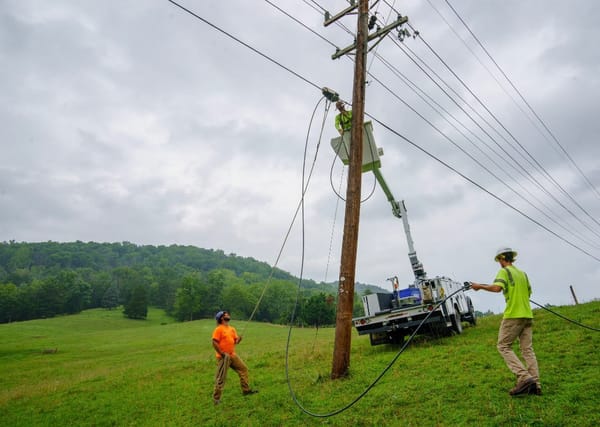Cable, Utilities at Odds on Contractor Approval for Pole Work
NCTA proposed a 30-day deadline for utilities to greenlight an ISP's contractor.
Jake Neenan

WASHINGTON, May 20, 2025 – Utilities and the cable industry are again clashing over federal pole attachment rules, this time over a cable plan for regulators to make it easier for attachers to use their own contractors to prepare poles for new communications equipment.
Pole owners have to approve the contractors that prepare poles for new communications equipment like fiber. When utilities miss deadlines to prepare poles, or if the work required is minimal, ISPs can handle the work themselves and must choose their contractor from a utility-approved list, or propose another for approval.
Earlier this year, NCTA, the cable industry trade group, asked the Federal Communications Commission to set a 30-day time limit for utilities to approve those requests. Utility companies have opposed it bitterly, saying the contractor vetting process takes longer than that and the move would be unsafe.
Representatives from Dominion Energy and major utility trade groups Edison Electric Institute and the Utilities Technology Council met Thursday with a senior aide to FCC Chairman Brendan Carr office to push back on the idea.
“A contractor proposed by an attacher to perform self-help make-ready work above the communications space will not be permitted – under any circumstances – to access an electric utility’s poles for that purpose before the contractor is fully vetted,” the groups said in an ex parte filing posted Tuesday.
ISPs routinely claim to the FCC that pole owners cause unnecessary delays in their deployments, while utilities counter the issue is a shortage of qualified contractors rather than intentional slow-walking.
“Based on NCTA members’ experience, it should not take more than 30 days for a utility pole owner to approve (or deny) a contractor that meets the [FCC’s] qualification requirements,” the group said in an April filing following a meeting with Wireline Competition Bureau staff.
NCTA represents the cable industry, counting two of the largest wireline ISPs, Comcast and Charter, as members. Charter announced plans last week to buy Cox, the country's largest privately held cable company.
NCTA argued earlier this month that approving a contractor “does not necessarily mean a lengthy vetting and onboarding process” like the monthslong one utilities describe.
The same group of utilities and their trade groups told staff in a separate May 8 meeting that the kinds of contractor requests NCTA wants expedited are currently quite rare, but if they started to come in after a deadline was established, utilities would be justified in denying them.
“NCTA’s proposal therefore will not resolve the lack of contractor availability to perform work above the communications space and will not expedite broadband deployment,” they said in an ex parte filing.
The FCC can set the terms of pole attachment deals between investor-owned utility companies and telecommunications providers, which include some but not all ISPs. That authority is preempted by local laws in 23 states and D.C., but it’s significant enough for pole owners and attachers to consistently bring disputes about replacement cost allocation and other issues to the agency.
The agency set up a dedicated team in 2023 to mediate those disagreements, fearing pole attachment issues could delay build outs funded by the $42.5 billion Broadband Equity, Access, and Deployment program. In adopting that order, commissioners also sought input on instituting timelines for large pole attachment orders and the contractor access issue, among other things.
Another ongoing battle is whether the FCC should step in to set deadlines for utilities to prepare poles for large attachment requests. Companies are currently left to negotiate that timeline for orders larger than 3,000 poles, and cable wants the agency to set defined guidelines, something utilities generally oppose.









